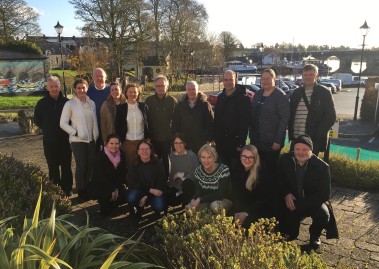
As it reaches its midway point, the EU funded SECURE project has taken stock of achievements to date with a view to agreeing the way forward to achieving its overall objective of transferring and implementing innovative energy solutions for housing and public infrastructure across seven Northern Periphery and Arctic regions.
Donegal County Council is one of eight partners involved the SECURE project which is funded to the tune of €1.8million under the Northern Periphery and Artic Programme 2014-2020 programme and the project will run until April 2019.
Low carbon services directory
Project partners have already developed a transnational low carbon services directory and this has been led by Karelia University of Applied Sciences (North Karelia, Finland) and enables regions to implement innovative services that have been previously tried and tested in other locations.
This means that regions can avoid mistakes made in other areas and an important part of this work is the involvement local stakeholders including local communities in deciding which Good Practices to implement in their own regions.
Developing Energy Action Plans
SECURE partners are sharing experiences in implementing low carbon actions for housing and public infrastructure. The Association of Local Authorities in Västernorrland (Sweden) is leading this action and is measuring the direct impacts and potential cost savings for each energy action. Project partners are also sharing this information with local communities and policy makers.
The next big step will be to develop Energy Action Plans or EAPs in five of the partner regions for housing and public infrastructures. These EAPs will see actions implemented in a structured, integrated way, allowing the systematic monitoring of efforts in achieving policy targets. Furthermore, EAPs will become an instrument for local authorities to communicate to stakeholders and to encourage local citizen participation.
Third Thematic Seminar in Leitrim
The project’s third thematic seminar, ‘Low carbon policy benefits’, has taken place in County Leitrim examining current and future energy policy challenges and solutions. Policy experts at a European and International level participated in this seminar to disseminate transnational good practices and to increase awareness of technologies and solutions for energy efficiency. Topics covered included energy policy, public sector energy efficiency, renewable energy solutions, community energy initiatives and implications for local economies.
Leitrim County Council also hosted the fifth meeting of the project and those attending had the opportunity to experience some good local energy practices in County Leitrim.
Project partners are:
The ERNACT network of regions (Lead Partner)
Ecology Action Centre (Canada)
Leitrim County Council (Ireland)
Donegal County Council (Ireland)
Derry City & Strabane District Council (Northern Ireland, UK)
Umhvørvisstovan Environment Agency (Faroe Islands)
Association of Local Authorities in Västernorrland (Sweden)
Karelia University of Applied Sciences (Finland)